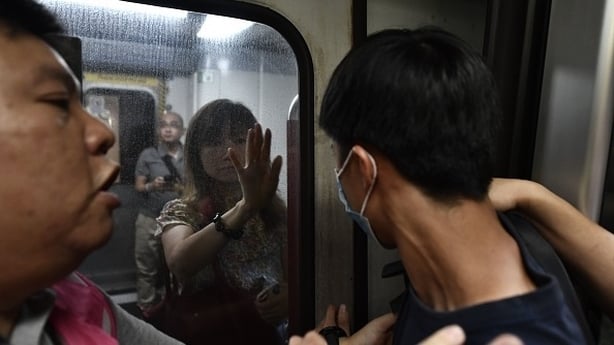Hong Kong police fired tear gas and rubber bullets in fresh clashes with protesters after a general strike caused transport chaos today, and as night fell in the Asian financial hub thousands of activists blocked roads in several districts.
The latest protests surpassed all the earlier shows of dissent for scale and intensity, escalating after Hong Kong's Beijing-backed leader warned that the city is on the verge of an "extremely dangerous situation" and represented a challenge to China's sovereignty.
What started several months ago as demonstrations over an extradition bill that would have allowed people to be sent to mainland China for trial have now evolved into a much broader backlash against the city's government and its political masters in Beijing.
We need your consent to load this rte-player contentWe use rte-player to manage extra content that can set cookies on your device and collect data about your activity. Please review their details and accept them to load the content.Manage Preferences
Commuters struggled to get to work in the rush hour this morning, with many rail and bus services suspended by activists who blocked trains from leaving stations, some by sitting in doorways, in the latest anti-government campaign.
Long lines of traffic snaked across Hong Kong island into the heart of the business centre and hundreds of people were stranded at the airport, where more than 200 flights were cancelled at one point.
The Airport Express train service was also temporarily suspended.

As some train and bus services resumed, tens of thousands of demonstrators fanned out across several districts, and there were running battles with riot police as some activists besieged police stations.
Thousands of black-clad protesters later occupied roads in the Admiralty district near government buildings for several hours before moving to other areas. By nightfall, protests continued across the city.
Speaking to the media for the first time in two weeks, Beijing-backed leader Carrie Lam remained defiant as she rejected calls from protesters demanding her resignation, saying the government would be resolute in maintaining law and order.
She warned that the protests were putting Hong Kong on a path of no return and had hurt its economy.
Read more:
Protesters erect barricades and block major tunnel
China calls for swift punishment over violence
Hong Kong protesters to be charged with rioting
"They claim they want a revolution and to restore Hong Kong. These actions have far exceeded their original political demands," said a stern-faced Ms Lam, flanked by senior members of her administration.
The protests pose the greatest political challenge to the government of the former British colony since it returned to Chinese rule and represent the biggest popular challenge to Chinese leader Xi Jinping since he came to power in 2012.
"These illegal acts that challenge our country's sovereignty, and jeopardise 'one country two systems', will destroy the stability and prosperity of Hong Kong," Ms Lam said, referring to the territory's administrative system since 1997, when it was handed back to China.
Within hours of the comments, protesters hurled umbrellas and other items at police in the residential district of Wong Tai Sin, where officers responded with pepper spray. Police also fired tear gas in Tin Shui Wai district, as tension flared.
The demonstrators blocked key roads, including three tunnels, cutting major arteries linking Hong Kong island and the Kowloon Peninsula. In Yuen Long district, a car rammed through a barricade, knocking down protesters.

